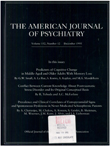Should protracted withdrawal from drugs be included in DSM-IV?
Abstract
OBJECTIVE: The authors reviewed both clinical data and selected laboratory research related to withdrawal from alcohol, opiates, and stimulants in order to draw a conclusion about whether the phenomenon of protracted withdrawal exists and should be included in DSM-IV. METHOD: Studies were located through computerized searches and reference sections of published articles. RESULTS: Symptoms extending beyond the period of acute withdrawal in alcohol and opiate dependence have been fairly consistently described; this is not the case with cocaine. Nevertheless, protracted alcohol and opiate withdrawal has not been conclusively demonstrated because of the failure of studies to do multiple time point sampling, to use standardized instruments and control groups, and to re-administer the substance in an attempt to suppress withdrawal symptoms. Further, the concept of protracted withdrawal itself is ambiguously defined. This confounds interpretation of the literature and precludes derivation of a unified concept of the term, which would be necessary for adding the diagnosis to DSM-IV. CONCLUSIONS: There is insufficient documentation to justify inclusion of protracted withdrawal in DSM-IV because of methodologic limitations of the studies and lack of consensus definition of the term itself. An outline for conceptualizing protracted withdrawal is offered in which the symptoms can be seen as: 1) a global post-use syndrome, 2) attenuated physiologic rebound, 3) toxic residuals, 4) expression of preexisting symptoms unmasked by cessation of use. Future efforts to identify signs and symptoms of protracted withdrawal should carefully define the parameters of the syndrome.
Access content
To read the fulltext, please use one of the options below to sign in or purchase access.- Personal login
- Institutional Login
- Sign in via OpenAthens
- Register for access
-
Please login/register if you wish to pair your device and check access availability.
Not a subscriber?
PsychiatryOnline subscription options offer access to the DSM-5 library, books, journals, CME, and patient resources. This all-in-one virtual library provides psychiatrists and mental health professionals with key resources for diagnosis, treatment, research, and professional development.
Need more help? PsychiatryOnline Customer Service may be reached by emailing [email protected] or by calling 800-368-5777 (in the U.S.) or 703-907-7322 (outside the U.S.).



